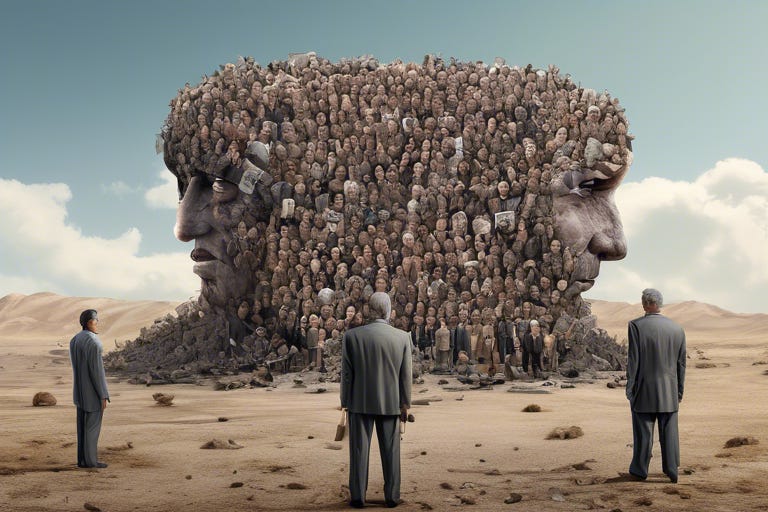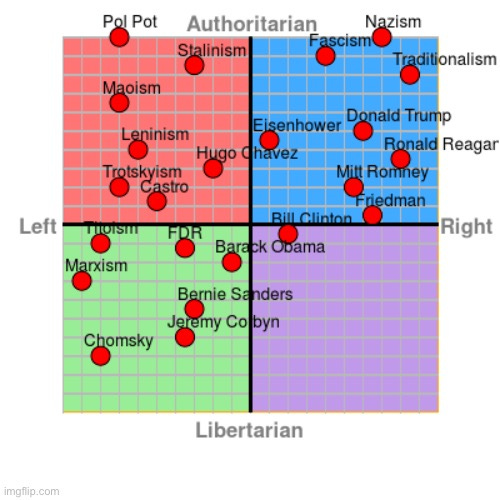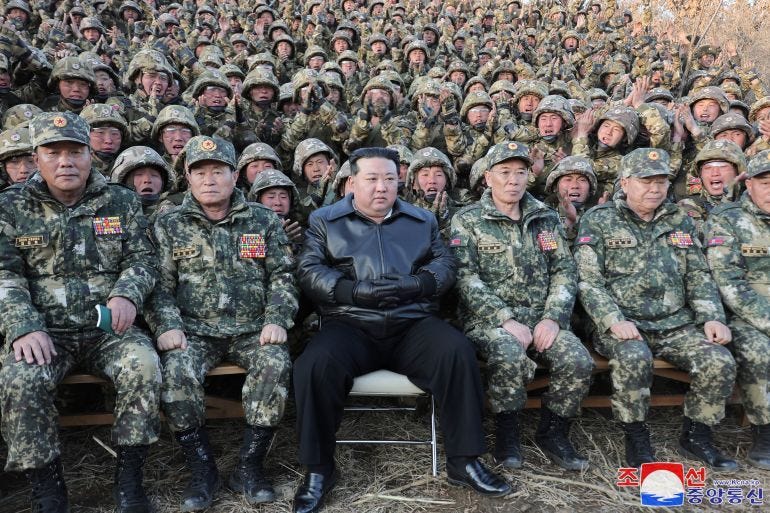The Left and Right are Obsolete
Reworking mental models of political orientation
People cling to the concept of Left and Right even though the ideas are long past their expiration date.
It wouldn’t take much to convince a person with any knowledge of the French Revolution that basing any of our systems on it is a Bad Idea™ and should be avoided. It was a bloody mess, marked a pivot point in history, and resulted in one of the most significant wars of all time, i.e. the Napoleonic Wars.
Yet we use a heuristic derived from the French Revolution to describe modern political sentiments — that of Left and Right. Without overdoing detail, during the French Revolution those who were in greater favor of radical social reform (put mildly) sat on the left side of the National Assembly, while those who favored preserving social institutions (like the royalty) sat on the right.
In modern-speak, those on the Left represented what we’d now call progressives, while those on the Right represented conservatives. We still use these terms today.
But I contend these terms are obsolete and no longer serve any good purpose. While the terms for many years provided valuable quick insights into where a person stood politically, they no longer do. This is especially true in elected politicians in Western countries, but can be applied to everyday people as well.
Note that in this case “obsolete” does not mean “totally useless.” It simply means “outdated” or “no longer applicable.” A spear is obsolete, but it doesn’t mean it can’t still kill a man. It’s simply no longer an effective tool for the modern era.
Instead of Left and Right, I propose two different models: An Up-Down model and an In-Out model. I’ll explain these in greater detail below. People will likely still, out of habit, use a Left-Right model to describe their own politics and that of those in positions of power, but the lines have become so blurry and warped that they no longer make sense.
Consider: Where has the populist, working-class, anti-war Left gone in most Western countries? Why is there a surge in “Right-wing” nationalism in so many countries? Why have political parties across political spectrums in the West become pro-war and pro-big business? And, if you live in any nation based on elections, why do average people rightly feel like they have less of a say than ever in their nation’s decisions?
As an example, some 70% of Americans polled supported peace talks to end the war in Ukraine — but our Congress has just sent tens of billions of more dollars to further support that war. Where’s the representation? There are countless other examples.
The Defunct Political Compass
You’ve likely seen political compass tests that place you in one of four quadrants, representing a left-right x axis and an authoritarian-libertarian y axis. While this model has provided a valuable quick overview of a person’s overall political leanings, the Left-Right model is no longer applicable, so the whole thing is a vast oversimplification based on outdated concepts.
The main outdated concept is found in governments themselves: In much of the Western and developed world, governments no longer adequately represent their populations. Instead, they represent a number of different interests that are certainly not themselves representative of the desires of their constituents. These include influences from big businesses like the pharmaceutical, arms, private equity, and tech industries, as well as transnational institutions and many more. I’m sure you can think of your own examples, and I’d love to hear about them.
So what does the Up-Down model look like, and what does the In-Out model look like? Let’s discuss.
Up and Down, not Left and Right
I was never intended to make a living as a graphic designer.
In the Up-Down model I propose, the concept is simple.
Up represents:
Stronger government centralization
More government control
More representation of moneyed interests and less representation of ordinary people
More power towards unelected bureaucracies
National or global and not local focus
Little accountability for elected and bureaucratic officials
Down represents:
Decentralization of power
Less government control
Representation of ordinary people rather than moneyed interests
Less power for bureaucracy
Local and not national or global focus
Greater accountability for elected and bureaucratic officials
If you’ve gathered by those definitions and/or from my previous writings that I’m more in favor of “Down,” then you’re an astute observer. But the “Up’s” are definitely on the rise and have been for many decades. A quote attributed to Oscar Wilde goes, “The bureaucracy is expanding to meet the needs of the expanding bureaucracy.” And how!
Left unchecked, government power will always grow. It will also grow less accountable to its people. As I wrote previously in a piece entitled “The Praetorian Problem,” this is an age-old problem that every powerful country faces. Once entrenched, power and the power-adjacent will be loath to give up that power.
I provided a comical example of bureaucracy gone mad in an old piece in which I compared the freedom of something as simple as getting a haircut in Texas to Vietnam as well as the licenses necessary to become a humble barber. As a brief example, in Texas it takes the same amount of time to earn a barber’s license as it does to earn a pilot’s license. In one instance, someone could get a bad haircut or lice. In another, an airplane could crash into a mountain or building. These are obviously consequences of a different scale — but these events requiring equivalent training are the results of bureaucratism.
Things get far more insidious than that small example, of course. It’s a culture-wide phenomenon where the center of power, in this case state/provincial, national, and transnational capitals, act like black holes for money and power. The more they absorb, the greater their influence. And the greater their influence, the lesser their accountability.
The Inside-Out Model
The Inside-Out model is even simpler than the Up-Down model. Think of it as a series of concentric circles, with the center being the core of Power (capitalized intentionally).
Inside means:
Greater access to power and wealth
More favorable treatment by judicial and bureaucratic systems and greater access to privileges
Outside means the opposite:
Less access to power and wealth
Less favorable treatment by judicial and bureaucratic systems and less access to privileges
This is far from a new concept, and can be best described by Feudal systems. For reference, I believe we are entering a new Feudal age. More on that in another post. But as a quick run-down of what Feudalism used to look like: A serf or peasant owed allegiance to their local lord. Their lord owed allegiance to his lord, and so on up to the highest power in the land, whether it be a duke, king, emperor, or otherwise.
Ask yourself: What level of access to wealth and power do you have? Where would you put yourself on the inside-out model? As opposed to the Up-Down model, the Inside-Out model is one of fact rather than belief. As a US citizen with a degree, for example, I’m far closer to the Inside than an illiterate cobalt-mining child in the Congo regardless of where I think power should reside.
What Does Up-Down and Inside-Out Look Like?
Even someone who had never heard of North Korea could understand a lot about the country from this one image.
If you want a perfect example of an Up-In country, look no further than North Korea. It could hardly be classified as Left or Right, since it’s simply a dictatorship where the people have no say. This model is a common one throughout history, as exemplified by the Absolute Monarchy of Louis XIV, the Tsars of Russia, or the Austrian Empire through the guidance of Chancellor and Foreign Minister Klemens von Metternich. Other examples include multiple Chinese dynasties, ancient Egyptian and Assyrian kingdoms, and so on. If the way to get towards power and wealth is to be closer to the center of power and the people have no say in their government, you’re looking at an Up-In regime.
In an Up-In regime’s best form, a wise ruler guides his or her people towards wealth and wisdom while providing security and infrastructure. In its worst form, it’s a full-on psychotic dictatorship like that of Josef Stalin or Mao Zedong, with property theft, little to no personal liberty, and arbitrary governance to the point of state-sponsored murder.
A Down-Out regime, despite the name sounding like a blues song, looks a lot more like the US in the frontier during its westward expansion, the Cossack “rule” of what’s now Ukraine and southern Russia, many Native American tribes pre- and post-colonization, or Ireland before the Viking or English invasions. Personal liberties were paramount and centralized control was…well, not centralized. In short, it’s not much of a “regime.”
In a Down-Out regime’s best form, you'll see lots of personal liberty, very little government control, easy access to power, low taxation, and almost no government oversight into daily life. In its worst form, it’s absolute anarchy, as can be seen in post-Qaddafi Libya today or in post-Pol Pot Cambodia. You can expect little to no personal safety and failing infrastructure, if any at all. Localized atrocities can become common and petty tyrants will find their way to power in small areas.
Note here that I’m discussing regimes, not societies. Whether regimes birth societies or vice versa is a chicken-and-the-egg question that could be argued either way, and countless historical points could back up either claim. Regardless, societies eventually form regimes, and regimes centralize power. Given time, stability, and interstitial crises, a Down-Out regime will eventually become an Inside-Out regime as power centralizes like it naturally does.
Homesteaders in front of their Nebraska home in the 1800’s.
As I’ve written before, however, states face a constant battle against entropy after a certain point, where the center can no longer hold and the forces dragging it outwards take hold. Societies usually experience a Down-Out period in their early stages, leading to a centralization of power and the realization of an Up-In regime until that regime collapses or withers. Then things all repeat again.
This cycle can take generations if not centuries to complete. There’s a happy medium to be found in each version, though it never lasts. Totalitarianism is despicable. Total anarchy is equally despicable. Only despots and their cronies benefit from 100% Up-In regimes, whereas only outlaws benefit from 100% Down-Out regimes.
How Did We Get Here, and What’s Next?
Regimes gain power and influence through — ironically — a combination of war, emergencies, and long peaces. A combination of the three lead inexorably to Up-In regimes. Only new regimes or those on the way down tend towards Down-Out structures.
But it doesn’t have to be that way. For the first time in all of human history, more people are literate than not. More people have access to information than not. We have the opportunity to claw back power from the Up-In model — but only if we do one thing first: kill the Central Banks. And doing so must be treated as no less than a Holy War.
The main driving force between the Up-In’s right now is fiat-based Central Banking. The power to create money out of thin air is a greater power than any magic, and one could argue that it itself is a form of dark magic. This is why I’m calling a fight against fiat Central Banking a Holy War. If being able to create money from nothing were a superpower, it’d be one of the best ones to have — I’d put it above a combination of flight and super strength.
The Up-In’s currently have their power precisely because they can create money out of nothing, change interest rates at will, and beggar a nation’s people by consistently devaluing their currency. Consider that the US Federal Reserve’s current target rate for inflation is 3%, which would mean that the US Dollar loses half its value every 24 years, and you’ll start to see the point — especially since we all know inflation is far higher than that. At the same time, the government still has plenty of money to spend since it’s as real as fairy dust.
But like all fiat currency systems, our current one — fully in place since August 15, 1971, and beginning in 1913 — will break. The skyrocketing national debts worldwide are prima facie evidence the system is unsustainable. After the breaking will come a reckoning, where those at the top of the Up-In system will seek to further consolidate power by implementing Central Bank Digital Currencies, or a new, programmable digital and fake currency that can be used to coerce behavior.
This must not be allowed to happen.
A currency crisis is guaranteed across all the Western world and then some. While this represents an opportunity for those at the top of the Up-In model to gain more power, it’s also an opportunity to pull more power towards the Down-Out model. There will be a power struggle, make no mistake.
The breaking of systems is a time of great shake ups, and it’s an opportunity we should welcome, since everyone seems to know something big is on the way. I’d rather we just get it done with.
What will come next I don’t know, and predicting the world’s state in 10 or 20 years’ time is either a fool’s game or fodder for a novel.
What I do know, however, is this: The Left and Right are obsolete. We have to think on our feet. It’s time for a new mental model to describe political views and models of Power. Try considering these models now: Where do you place yourself on the Up-Down and In-Out models? I’ll be curious to hear your thoughts.








The current framing of Western politics is ultimately what I believe is best described by Mike Benz in what he calls "The Blob". It's fundamentally the foreign policy establishment (FPE) arm of the government that manages the American empire in an outwardly fashion.
The composition of the FPE is two-fold: internal government resources and external corporate and financial stakeholders, who Benz refers to as the "donor drafter class" of government activity. The "drafter" stakeholders are like dolphins following a boat so they can ride the waves and get prime pickings of fish disturbed in the boat's wake.
The Blob has a ferocious appetite for preserving their international rules-based order (i.e., hegemony), and thus anything that challenges that order (e.g., the West's World Bank vs. China's Asian Infrastructure Investment Bank, superpower shares of IMF, and so forth). This self-preservation effort is their highest priority of all.
With that, there's no authentic diversity in political orientation - there's just the blob. Political diversity might have been a luxury of the old world order, but it went away when they transitioned into the new clown world order.
I honestly think the only realistic path for The Blob to lose power is when it self-destructs. It seems like the inevitable outcome, but the question is will it destroy all of us on its way out?
As far as political orientation classification goes, there's a more simplified coordinate system that can be deduced - (X) government (Y) not government. (Y) being the only choice that's congruent with natural rights.
I found the criticism towards the central bank a little cliche, without emphasizing a solution to that particular problem. There are fair criticisms towards the central bank by anyone who watches their decisions such as unnecessary bailouts. However the mechanism of printing money is "supposed to be" a tightly regulated one. Simply speaking, there aren't a lot of better alternatives to the current Keynesian models. In addition to that, there are a variety of economic theories that look at the mechanism of money printing. Some would agree the infinite supply of currency is unsustainable, like one giant bubble waiting to implode, even with tight restrictions. On the other hand, lack of currency fluidity creates harsh environments like the dirty 30's. I see you're looking at this from a political lens but the regulation of money printing is so fundamentally important to a functioning society that it is a priority for most nations. Lastly, America has benefited more from money devaluation than anyone else. There are always tradeoffs with different systems, but it seems to me America has had the financial cards stacked in its favor for nearly a century. Ironically, the rise of authoritarianism came from America. China's wealth is built off the backbones of the US dollar.
There's a whole discussion here but this is just a slight perspective on the article. Overall, it was insightful, and I enjoyed reading your views.